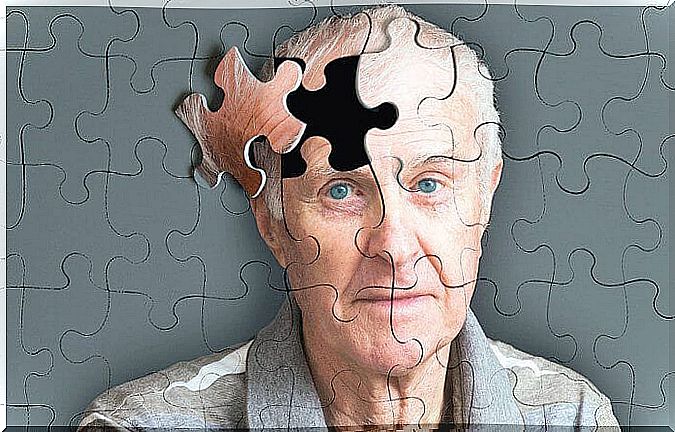5 Signs That Precede Alzheimer’s

Alzheimer’s is a type of dementia that usually shows up from the age of 60 (approximately). Unfortunately, with all the means at our disposal, no cure has yet been found. Its progression is slow at first, then those who suffer from it begin to have difficulty remembering certain things. Finally, memory loss ends up being so severe that patients no longer even recognize their loved ones. This is when they become dependent on others.
During the early stages of this disorder, parts of the brain that control thinking, memory, and language begin to be affected. It is often said that Alzheimer’s happens quietly; however, there are certain signals which can indicate its presence, even when they are not very pushed.
We are more likely to suffer from Alzheimer’s if, in our family, people have suffered from this disease.
1. Carrying out daily tasks becomes more difficult
Every now and then, it’s normal to forget the keys inside the house, forget to pay a bill, or forget about anything else. However, people who start to suffer from Alzheimer’s experience it more frequently; this can even sometimes imply some danger for them.
For example, these people can leave the gas on without realizing it, with all the risks that this implies. They can also leave a cake baking in the oven and forget to take it out. Sometimes they also forget how to prepare certain very simple meals or how to serve them. That is to say, they do not remember how to arrange the plates, napkins, cutlery …
Little by little, Alzheimer’s disease causes certain limitations that prevent the most simple and insignificant daily tasks from being carried out.

2. Communication problems are significant
We have sometimes already experienced the phenomenon which we know better as “I have it on the tip of my tongue”. But this daily phenomenon, which refers to a problem with retrieving information, may have a more serious meaning in some people. This can be a signal that indicates that we are starting to suffer from Alzheimer’s.
People with this disorder have serious difficulty finding the right word when trying to communicate information. Sometimes it is even difficult for them to complete a sentence or to give it an adequate meaning. This happens because they are not able to substitute that word they have “on the tip of their tongue” with a synonym or even to explain what they mean using other terms.
As a result of this disease, people with Alzheimer’s begin to have increasingly significant communication problems as their vocabulary is reduced; they thus forget the simplest words, used on a daily basis and without which it is very difficult to express themselves in a coherent and understandable way.
3. Disorientation in well-known places
One of Alzheimer’s most alarming signals is disorientation. People who suffer from this disease get lost when they go out on the streets, in their own neighborhood. Sometimes they may even suffer from brief episodes of disorientation in their own home.
They suddenly no longer know where the toilets are or no longer recognize the house in which they live. Experiencing this situation can cause serious episodes of stress or anxiety. These signs should be taken into account, even if they are very short, because they can indicate that Alzheimer’s is emerging.
With age, we sometimes suffer from a slight cognitive deterioration that often makes you forget things, such as a doctor’s appointment or where you put an object. However, not all people with mild cognitive impairment have Alzheimer’s.

4. Difficulty thinking in the abstract
If we leave our children with their grandfather or grandmother, take their bath and they completely forget about them, it could be a sign that they have Alzheimer’s. It is normal to experience moments of temporary confusion, but sufferers completely forget that they were responsible for something or someone and even have trouble remembering it when told it was.
It also happens to them when they are looking for something. People with Alzheimer’s easily lose things because they are used, for example, to store sugar in an inappropriate place, such as the oven or the fridge.
Thus, when they go to look for it in its usual place, they do not find it and forget where they have stored it. Sometimes they also forget what they were doing. For example, if they were cleaning the house and then go to get the broom, they may forget on the way that they were cleaning and start doing something else.
5. Very sudden mood swings
People with Alzheimer’s have a very sudden change in mood for no apparent reason. They may start to cry when they were very calm or may get angry when they are smiling.
But beyond all this, a change occurs and reveals that one suffers from this disorder: people lose the initiative to do things. Forgetting what they were doing, being constantly disoriented and changing moods all the time exhaust them so much that they tire easily and become extremely passive when it comes to doing something.
People with Alzheimer’s need someone who motivates them to do things, such as going for a walk, talking to other people, looking after their house, washing themselves… Because this disease makes it completely disappear. initiative.
Here are some signals that we can take into account to suspect possible dementia. It is necessary to remember that these signs can be very subtle at first: we can take them for usual phenomena that happen to all of us and not consider them serious. However, they will become more and more obvious, clear and frequent over time.

Detecting these signs when Alzheimer’s is in the early stages of its development will make treatment more effective, thus delaying the progression of the disease. This will allow the patient to maintain their independence for longer and their quality of life will not be reduced as quickly.








